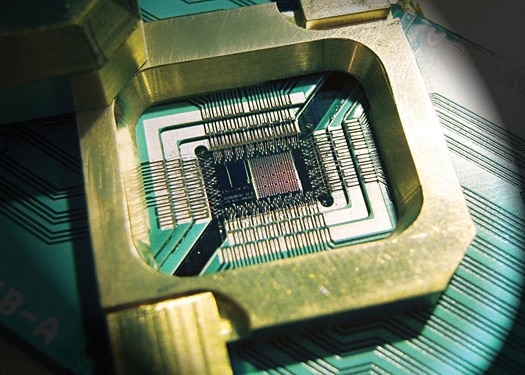
Quantum computing is advancing at impressive rates. (Image Credit: Wikimedia Commons)
New technological breakthroughs have been surfacing every week at an impressive rate, leading to endless possibilities for advancements. By using a photonic quantum computer chip, researchers in Xanadu, Toronto, solved a sampling problem in just 36 microseconds that otherwise takes supercomputers and algorithms 9,000 years to complete.
The Borealis chip relies on light bursts for quantum data transmission. It’s an impressive workhorse with 219 qubits and 129 being utilized in this project. The team says they think photon-based quantum chips have the potential to become the most popular architecture going forward due to their scalability over other solutions.
“This work is a critical milestone on the path to a practical quantum computer, validating key technological features of photonics as a platform for this goal,” the authors wrote.
Each quantum gate can be programmed, making the Borealis chip exceptionally advanced. Sure, other chips have this capability, but they still can’t outperform conventional computers. The team says this work could lead to quantum chip advancements down the road.
Although this is a huge breakthrough, quantum computers still need some work. The UK Ministry of Defence purchased its first quantum computer for testing purposes, but we could wait years before realizing how or when they’ll be used regularly.

Quantum computing could eventually end the cryptocurrency world with vulnerable attacks. (Image Credit: Kanchanara/Unsplash)
While there’s a lot of hype surrounding quantum computers, the technology hasn’t quite advanced where it can destroy the cryptocurrency world yet. However, it may happen eventually. According to a Deloitte study, around 25% of Bitcoin circulating is vulnerable to a quantum attack. Itan Barmes, a Cybersecurity specialist, discovered a massive quantum computer exposure level applied to the Bitcoin blockchain would present a systemic risk. “If [4 million] coins are eventually stolen in this way, then trust in the system will be lost, and the value of Bitcoin will probably go to zero,” he says.
Generally speaking, encryption relies on asymmetric cryptography. Vulnerable Bitcoins include those developed before 2010 when public keys didn’t undergo a different and safer hashing format. Bitcoin addresses are also vulnerable since they were only used once and can be seen on the blockchain. Theoretically, a quantum computer could hack up to four million Bitcoin addresses, leading to unlocked private keys and the transfer of values to a different address. This process is called a storage attack.
Then, we have a transit attack, which means that all Bitcoin transactions are vulnerable. In January 2022, a Universal Quantum team revealed that a 1.9 billion qubit-capacity quantum computer could break Bitcoin’s encryption in the 10-minute Bitcoin mining window. It would take one hour with 317 million qubits.
Have a story tip? Message me at: http://twitter.com/Cabe_Atwell
